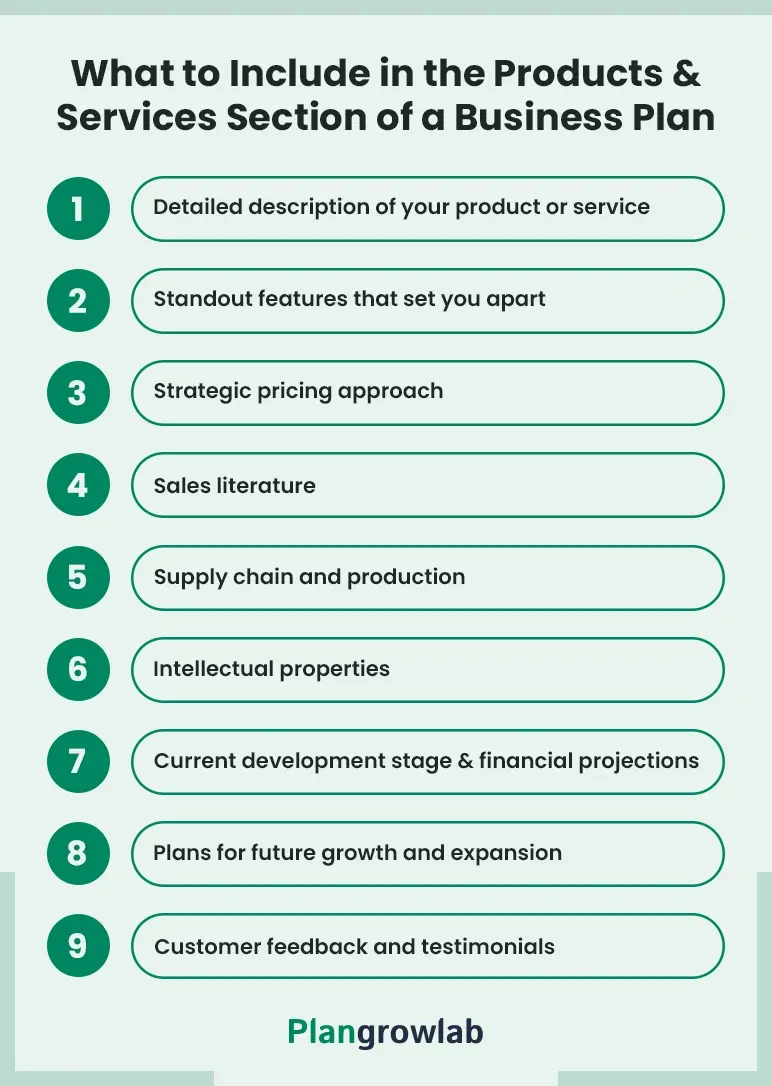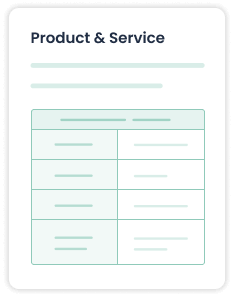I consider the products and services section of a business plan one of the most underused opportunities to win over investors or partners. Too often, it’s just a quick list of what a business sells: Name, description, maybe a price, and that’s it.
But this section can do so much more. It’s where you answer the two questions that really matter: What do you offer, and why should anyone care?
When we work with founders, this is where they often get stuck. The most common things we hear are:
- “We’re not sure how to explain our product without drowning in details.”
- “We have multiple services and don’t know which to highlight.”
- “Our pricing is competitive, but we’re not sure how to present it in the plan.”
In this article, I’ll walk you through how to write this section that actually sells your offering, the same process we use with our clients to give investors, lenders, and partners confidence in the business.
What is a product and services section in a business plan?
The products and services section in business plans is where you clearly answer the following:
- What you’re offering (specifics of your product and/or services)
- How your offering benefits your customers (how it solves customers’ problems)
- What makes your products or services different from what’s already available in the market
These points provide potential investors, partners, or stakeholders with a clear understanding of your business’s unique value proposition.
What to include in the products and services section of a business plan
Writing an effective products and services section requires a structured approach. Here are the 10 key components to include that stand out:

1. Detailed description of your product or service
First things first: “your offering,” the core of your business. I always start by asking clients to explain what they provide in plain language. Whether it’s a product, a service, or both, clarity here sets the tone for everything else in your plan.
If you offer a product, you’ll want to cover:
- How it works (functional features and specifications).
- Its physical characteristics (size, color, materials used, etc.)
- Its quality and durability.
If you offer a service, outline:
- How the service works including the steps involved in how it’s provided or delivered to a customer.
- Its benefits customers will enjoy.
- Its special features like customization.
From my experience, the goal here isn’t to overwhelm with technical jargon; it’s to help your audience quickly grasp the value and imagine themselves using what you offer.
2. Standout features that set you apart
What about your product or service will make people choose it over the competition?
Is it superior quality, enhanced functionality, or a unique selling proposition (USP) that competitors can’t replicate?
I often encourage clients to make side‑by‑side comparisons with competitors to highlight what’s different. It’s not about tearing others down; it’s about making your own strengths unmistakable.
Here are a few ways to reinforce your point:
- Call out the features that truly differentiate you.
- Reference endorsements or validations from credible industry voices.
- Use relevant market research to show your product’s unique features actually match what customers want today.
The aim is to position your offer so clearly that your audience understands why it’s the smart choice. You’re showing them it’s worth investing in, not just because you say so, but because the evidence backs it up.
3. Strategic pricing approach
Katharine Paine once said, “The moment you make a mistake in pricing, you’re eating into your reputation or your profits.”
She’s right. Pricing isn’t just a financial decision; it’s a positioning decision. It defines how your offering sits in the market and whether your target customers see it as accessible, premium, or somewhere in between.
When I work with clients, pricing discussions go deeper than just “covering costs.” The right price balances three things:
- Customer expectations
- Perceived value
- Profitability
That’s why this section in your business plan should explain how you’ve priced your product or service and why that pricing makes sense for your ideal customers. Here’s a simple framework we often use:
| Aspect to include | Description |
|---|---|
| Cost Structure | Breakdown of production or delivery costs |
| Pricing Model | Whether you use cost-plus, value-based, competitive pricing, etc. |
| Profit Margins | Expected margins and how they contribute to overall profitability. |
4. Sales literature
Pricing alone won’t persuade customers. You also need to show them why your product or service is worth it and that’s where sales materials come in.
I tell founders to treat this as their storytelling toolkit. Whether you’re selling through direct sales, retail, wholesale, or online, your materials should do more than just “look nice.” They need to speak directly to customer pain points and position your offering as the obvious solution.
Examples include:
- Explainer videos that simplify complex offerings
- Landing pages designed to convert interest into action
- Infographics or one‑pagers summarizing key benefits
- Case studies proving results
The key is consistency. Every piece of sales literature should reinforce your pricing position and make the value clear. When customers understand both what you offer and why it’s priced the way it is, they’re far more likely to buy.
5. Supply chain and production
This is where you explain how your product or service actually reaches the customer. A strong supply chain plan proves you can deliver consistently and reassures investors as well as partners that you’ve thought through the operational side of your business.
When I work with clients, I encourage them to cover four key points:
- Source: Where does the product come from? Is it manufactured in‑house or outsourced?
- Production process: What are the key steps involved in creating or assembling your product?
- Quality control: How do you make sure every product meets your quality standards?
- Service delivery: If it’s a service, how do you ensure it’s delivered consistently to the same standard every time?
It also helps to identify your key suppliers, manufacturers, and partners. Naming them and explaining why they were chosen adds credibility. Investors will want to see that you’re working with reliable partners who can meet demand without compromising quality.
79% of those with highly efficient supply chains saw substantially better revenue growth than the average.
6. Intellectual properties
The intellectual property (IP) section gives your audience confidence that what you’re offering is protected and that you’re operating within legal boundaries.
I recommend listing any relevant IP assets, such as:
- Trademarks
- Copyrights
- Seller permits
- Trade secret
- Patents
- Other licenses or insurance policies
This is also the place to mention any legal issues you’re currently dealing with and how you plan to address them. I believe transparency here builds more trust than avoiding the topic altogether. It tells investors you’re aware of the risks and have a plan to manage them.
7. Current development stage and financial projections
Take the opportunity to talk about where your product stands in terms of development. When I work with clients, I encourage them to be very specific here. For example:
- Ready for launch: The product is market‑ready with production, supply chain, and sales materials in place.
- Beta testing: You’re collecting feedback and making improvements before full release.
- Idea stage: The concept is validated, but development, funding, or resource allocation is still underway.
From there, outline what’s left to get to market: Manufacturing steps, final testing, certifications, or hiring key roles. This shows you have a clear plan for moving forward.
Once you’ve covered the current stage, shift into your growth expectations. How many new customers do you anticipate in the next year? What revenue growth percentage are you targeting?
From my perspective, even a conservative, well‑reasoned projection makes investors far more comfortable than avoiding the question altogether.
8. Plans for future growth and expansion
Investors also want to know your business isn’t static. Show them your vision for the future, not in vague terms, but with specific, actionable plans.
That could mean:
- Rolling out new features or improving current ones.
- Expanding into additional geographic markets.
- Introducing complementary products or services.
When I help clients map this out, I always tie it back to market demand. The most convincing growth plans are those that clearly respond to opportunities or customer needs, not just ambition for ambition’s sake.
9. Customer feedback and testimonials
This section is all about building trust and credibility.
If you have customer reviews or testimonials, feature them here. If you’re earlier in development, use insights from pilot programs or beta testers. Pairing these with relevant market analysis gives you a stronger case; it shows your product fits broader industry trends.
One thing I remind founders: Testimonials work best when they link directly to the value you’re promising. If your plan says your product improves efficiency by 30%, a customer quote confirming that carries far more weight than a generic “We loved it.”
Example of a product and services section in business plans
To help you get started, here’s an example of a "Product and Service" section in a traditional business plan for “Paws & Relax,” a dog grooming business.
Overview of our product and service
At Paws & Relax, we deliver professional dog grooming services right to the customer’s doorstep, performed by our certified groomers.
Additionally, we offer a curated selection of premium pet products that are also available through our e-commerce platform.
Our goal here is to simplify pet care for busy owners by offering convenient, at-home grooming, so they can skip the stressful trips to the salon.
Here is a list of products and services we offer:
- Full-Service Grooming: Bathing, brushing, haircut, nail trimming, ear cleaning, and teeth brushing.
- Specialty Spa Treatments: Hypoallergenic shampoos, de-shedding treatments, pawdicures, and aromatherapy baths.
- Mobile Grooming Services: Grooming at the client’s doorstep for added convenience.
- Retail Boutique: High-quality pet care products, including shampoos, brushes, and accessories.
- Membership Packages: Subscriptions offering discounts on recurring grooming appointments.
Now what makes Paws & Relax stand out?
- Personalized Care: Tailored grooming based on breed, size, coat type, and customer preferences.
- Certified Groomers: Trained and certified professionals with expertise in handling dogs of all temperaments.
- Calming Environment: Use of pet-safe, non-toxic products, and soothing music to reduce pet anxiety.
- Mobile Units: Fully equipped, hygienic grooming vans for ultimate customer convenience.
- Eco-Friendly Practices: Commitment to sustainability through biodegradable products and water-saving techniques.
Pricing approach
We have set our prices to match the high-quality services and products we offer, while also making sure they’re fair and competitive.
We use a mix of value-based pricing and competitive pricing to ensure our prices reflect the quality and convenience we provide.
Here's a breakdown of our service prices:
- Bathing: $25 (includes shampoo, water rinse, and towel dry)
- Haircuts: $40 (includes bath, haircut, and styling)
- Nail trimming: $15 (includes nail trim and paw pad cleaning)
- Ear cleaning: $10 (includes gentle ear cleaning with pet-safe solution)
- Teeth brushing: $10 (includes brushing with enzymatic pet toothpaste)
Here's a breakdown of our product prices:
- Shampoos: $15–$25 (depending on size and type)
- Collars: $12–$30 (variety of designs and sizes)
- Toys: $8–$20 (durable, eco-friendly materials)
- Nutritious treats: $5–$20 (based on size and type)
- Water and food bowls: $10–$25 (depending on material and design)
Below is a quick look at how Paws & Relax compares to traditional grooming salons and competitors in key areas.
Supply chain and production
For our pet products, we partner with reputable suppliers like PetCo, a leading pet retailer with over 1,500 stores across the U.S., and Chewy, an online pet product retailer serving over 20 million potential customers.
Both companies meet rigorous quality standards, ensuring that every product we offer is safe, effective, and beneficial for pets.
Current development stage and financial projections
Paws & Relax is currently serving its local area with a loyal customer base.
We plan to expand to nearby cities and increase our grooming fleet by 30% over the next year.
Also, we expect a 15% increase in sales revenue driven by the growing demand for home-based services and new product lines.
Plans for future growth and expansion
Looking ahead, we plan to broaden our offerings by introducing additional pet care services like training and daycare.
We also aim to diversify our future product range by including premium pet accessories and exclusive grooming packages.
With these initiatives, we plan to extend our reach, increase our market share, and solidify Paws & Relax as a comprehensive, trusted brand in the pet care industry.
Tips on writing a good products and services section
When I help clients work on this part of their business plan, I find that a few simple rules make all the difference. Here’s how to make your products and services section stronger and more persuasive:
- Be concise: Craft this section in a way your readers can get to know everything by just scanning the content. No need for redundant details; just the necessities.
- Consider your readers: Whom are you speaking to—investors, customers, or partners? Customize your tone accordingly to easily secure funding or gain a partner (whatever your intentions are).
- Flaunt your expertise: Share why you're the best person to provide them. Include your education, experience, testimonials, awards, endorsements, or anything that brags about your expertise in your field.
- Highlight the problem you solve: Every successful product or service solves a problem. What’s the pain point your business addresses? Make sure your readers see how you’re filling a gap in the market that others haven’t yet.
Conclusion
To wrap up, the product and services section is your chance to highlight what makes your offering unique and valuable. It’s not just about what you sell, but how it solves a problem and stands out in the market.
Focus on key details like standout features, pricing strategy, competitive edge, and growth potential in a correct business plan format.
If you’re still not sure, just let professionals handle it. Our expert writers and consultants at Plangrowlab can help you create a detailed and effective business plan with a product and services section that meets your requirements.
So why wait? Contact us today!
Frequently Asked Questions
What to put in the products and services section?
Explain what your business offers, how it helps customers, and what makes it different. Include details about key features, pricing, competition, supply chain, customer feedback, and growth plans.
How much detail do I need to include in my products or services?
Keep it simple and clear. Share the most important details that show the value of your product and how it's different from others. If it’s a new business with a new product or service, highlight its use in detail.
Do I need to include pricing information in the products and services section?
Yes, include pricing so readers can understand how your product is priced. Explain why you chose that pricing method (value-based, competitive, or cost-plus).
What mistakes should I avoid when writing about products and services?
Avoid vagueness, neglecting competitor analysis, and overloading with unnecessary details. Use clear, simple language and ensure your offering’s unique value is well-explained.


